- Home
- Jasper Fforde
The Constant Rabbit Page 6
The Constant Rabbit Read online
Page 6
None of this happened because rabbits had a generally more robust relationship with consequences than humans, and the agents’ commands to halt were met with a series of giggles from the Labstocks, who mingled briefly to confuse us before running off in separate directions as though it were some sort of jolly game.
‘Don’t just stand there like a twat, Knox,’ came Lugless’s voice in my earpiece, ‘get after the fourth.’
I had until that time been stunned into inactivity by the sudden turn of events. I was, after all, a Spotter – not a Field Agent. This wasn’t what I did. Even so, I looked around and saw the fourth Labstock walking in a relaxed manner towards the ancient Market House at the top of the main street.
‘Look,’ I said into my microphone while pretending to rub my mouth, ‘I’m not trained for this. I’m not sure I even have the power of arrest.’
‘I don’t want you to arrest him, idiot,’ came Lugless’s voice, ‘I want you to get a good look at him.’
This seemed reasonable so I walked up the road in the direction the Labstock had gone, lost sight of him as he walked to the right of the Market House, then caught another glimpse of him walking up the steps to the churchyard once I’d reached Rossiter’s bookshop.18 When I got to the churchyard I just caught sight of him as he vanished in through the door. I walked in an unhurried pace towards the church, acutely aware that the only people near me were rabbits. And although they weren’t looking in my direction, the rabbit’s peripheral vision was so good, it’s safe to assume that if you can see a rabbit, they can see you.
I stopped to tie the whippet to the foot-scraper and took the opportunity to whisper into the microphone.
‘Flopsy suspect in the church, but this could be a trap. The whole set-up might simply have been to bag a Spotter.’
This could indeed be true. Spotters were forbidden to go on-colony for that very reason, though my identity and job at the Taskforce were well guarded: hence the accountant cover story.
‘Of secondary consideration,’ came Lugless’s voice. ‘I want every single one of those fat furry bastards in the clink before teatime.’
I took a deep breath to calm my nerves, then pushed open the door and stepped inside the church. It was a good size, imposing but not overgrand, and boasted a double nave and tall stained-glass windows. A vicar was humming to himself while tidying the leaflets, postcards and guidebooks that were arranged on a small table.
I looked around to see whether I could spot my quarry. There were two rabbits inside, one Wildstock, one Labstock – and both were dressed in the sort of pale blue tabard that befits a church volunteer. I thought it was a different Labstock, but then I noticed an identical shooting jacket to the one 7770 had worn hung on a peg in the vestry, and it was still swinging from being hurriedly placed. I was just going to wander over to the Labstock on the pretext of studying several old tombs when the vicar caught my eye.
‘Good afternoon,’ he said.
‘Good afternoon,’ I replied genially. ‘I see you have our furry friends19 as volunteers.’
Although the rabbit religion had no issue with where and when you worshipped, nor who, it was still unusual to see them in a church, probably because churches were as far from a cosy moss-and-fur-lined warren as you were likely to get.
‘Yes indeed,’ said the vicar. ‘Saint Mary’s is a church that accepts everyone through its doors, irrespective of taxonomic classification.’
I wasn’t going to get any closer to the Labstock without conversing at least a little to allay suspicion, and the Labstock did not seem to be in a hurry to leave.
‘Back home in Harrogate where I come from as I am a Yorkshireman, we have no rabbits,’ I said. ‘What is the Church’s view?’
The vicar nodded his head thoughtfully.
‘The Church’s opinion is divided. Although we here on the ground consider rabbits as just one of many of God’s blessed creatures, the official line is that they are a lower animal, and when they arrived they were viewed as an abomination – the sinful product of a satanic union. When that was disproved from the DNA evidence, our stance softened. I think the problem is that while humanlike, they are not actually humanful, and according to scripture and teaching, mankind was made in His image, as they were in their Grand Matriarch Lago’s. Church policy is that we don’t allow them to participate in church matters but we will not exclude them from our house – so long as there is no crunching of lettuces from the pews and pellets are kept to an absolute minimum.’
He paused for thought, then recited his next comment as though learned from a crib sheet.
‘We must love all God’s creatures, but allow change and acceptance to happen slowly and at a pace commensurate with acceptable norms and customs.’
‘I see,’ I said, and after making some excuse about wanting to view some particularly fine statuary, moved towards where the Labstock was still dusting. If he knew I was from the Taskforce he made no sign of it, and even nodded a greeting. But of distinguishing marks on his coat or whiskers or eyes – there was nothing.
‘With you in five, Knox,’ came Lugless’s voice in my ear. ‘Confirm to me suspect still in church.’
I tapped the microphone twice on my wrist, and stared with feigned interest at the impressive array of tombs, glad that the other agents would take the burden of action from me. I had done a fair job, and should not be poorly thought of. My career might very well still be secure.
I heard the doors to the church open on both sides, and turned, expecting to see the agents arrive. But it wasn’t them, it was more rabbits – and all of them Labstock. Nine all told, and they hastily grabbed volunteer tabards that the vicar was handing out. Within a few minutes they would all be hopelessly mingled. I looked across at the target Labstock, who was staring back at me with a smile on his placid features. He was definitely the one we were after, and once the other Labstocks had moved in and around him, I would have no way of pointing him out, or even finding out who he was.
But I was wrong, for at that moment the sun came out, and shone through the church window, transfixing Flopsy 7770 in a shaft of white light that perfectly illuminated his ears. There, on his left, about two-thirds of the way up, was a unique pattern of capillaries that looked like a squashed Tudor rose.
I didn’t have time to make comment as the influx of bustling Labstock church volunteers gathered in a clump around us, moving and whirling and mixing so that within a short space of time I had no idea who was who. I was impressed. 7770 had been smarter, and quicker, and one step ahead of Lugless. There was definitely a Rabbit Underground, and the Labstock – whoever he was – had been part of it. And if I saw him again I’d know exactly who he was.
So long as he had a bright light behind him.
Griswold & Gossip
Because of their dislike of obsolescence, rabbits only chose domestic appliances that would last a minimum of half a century. Dualit toasters were favoured, as were Hoovermatic washing machines, vintage Kenwood Chef food mixers, seventies push-button phones, treadle sewing machines and large-format cameras. They loved wet-chemistry photography; the older the process the better.
‘How was work?’ asked Pippa when I got home after the debriefing. Even to my own daughter I had always maintained I was a low-level payroll accountant. I told someone I was a Spotter once, and there had been consequences. I didn’t want that again.
So I couldn’t tell her that of the three Labstock we’d arrested, all had cover stories and plausible IDs and no amount of coaxing would change their story. I couldn’t tell her that their briefcases had contained sandwiches, nine yoyos, sachets of raspberry-flavoured Angel Delight and copies of Rabbit Vogue; couldn’t tell her that Lugless had applied to the Senior Group Leader to use ‘firmer methods’ to get them to talk, but had been overruled on the grounds of operational secrecy. I couldn’t tell her that my sighting was now the only possible method of identification of Flopsy 7770, couldn’t tell her that tomorrow I would be staring at the bu
nshot of every Labstock we possessed until I found the one they were looking for, couldn’t tell her the reason I’d been delayed was because the person who had come to pick up the whippet had been late. I had to sit with it for an hour while it quivered and stared at me with its sad bulging eyes, like some thinned-down canine version of Peter Lorre.20
I could tell her only one thing:
‘Work was … mundane, as usual,’ I said. ‘What about you?’
‘I was doing a day course entitled “Why Spreadsheets Are Not Boring”, so same as you, I guess.’
Pippa made supper after that, and, true to form, Victor Mallett dropped round to see whether I’d found out where ‘that rabbit’ had come from. I told him that as far as I could see, she was just passing through.
‘Doubtless a scam,’ said Victor with a grunt. ‘Rabbits are always on the make.’
‘Was any of that true?’ asked Pippa once Victor had gone.
‘No – she lives in Leominster with her third husband. Not a word to Toby.’
‘Right you are.’
Over the next two weeks I spent all my office time trying to ID John Flopsy 7770, and by the end of a fortnight I had got precisely nowhere, and had exhausted only thirty-five per cent of the male Labstocks on record.
‘7770 might not even be on the books,’ said Flemming, eager to have me back on normal spotting duties, but Lugless spoke to the Senior Group Leader and had me continue going through the bunshots, and only rejecting those I was seventy-six per cent certain weren’t him. Lugless took being hoodwinked by his own kind as a deeply personal affront, especially as, to add insult to injury, someone had tied two knee-length grey socks to the rear bumper of his Eldorado – an obvious jab at his earless state, and making a mockery of his attempt to disguise himself, although personally, I thought the eyepatch and tam-o’-shanter just bizarrely random enough to have worked.
At the Buchblitz that weekend we gave Mr Beeton a twenty-seconds pause, as befitted his status as a generally reliable member of the team. Norman and Victor Mallett kept a eager eye out for Connie’s return while we were Speed Librarying, but she didn’t turn up, so the brothers concluded I was right: just passing through.
While I spent another fruitless week searching for a hint of the squashed Tudor rose capillary ear pattern, Hemlock Towers opposite was being cleared of Mr Beeton’s effects. The good stuff was taken by his closest relatives, his library sold to Addyman’s in Hay-on-Wye. His arguably worthless knick-knacks were picked through for value by his lesser relatives, and his meticulously researched twenty-year project on the development of Medium Density Fibreboard was taken away in a skip to be recycled, ironically enough, into Medium Density Fibreboard.
Hemlock Towers then stood empty once more, and gossip soon turned to who might become the new tenants. There were several false leads, of course – an Argentinian couple on the run from the police; someone who looked a lot like Rick Astley; a National Geographic photographer; a barrister convicted of embezzlement; a retired trapeze artist; someone else who looked like Rick Astley but did, in fact, turn out to be Rick Astley; another National Geographic photographer, unrelated to the first in an improbable coincidence. All came to nought, and it wasn’t for another fortnight that word of the new tenants came to me by way of Mrs Griswold, who when she wasn’t being a supremely lacklustre Stanley Baldwin ran the corner shop and post office. She was the village gossip but didn’t relinquish her skilfully wrought intelligence for free, and had her own unique exchange rate. Something seriously juicy offered up to her altar of tittle-tattle could keep you in credit for weeks, but tired gossip already heard had no value at all. Luckily, I was in credit; I had overheard details of Mr Beeton’s last will and testament, and it appeared that Mrs Silver the housekeeper was due for a considerable sum, something that gave rise to suspicion that her long-standing employment might have involved something more significant than just warm milk and dusting.
Once this piece of information was taken, digested, tutted about and then mentally filed, Mrs Griswold beckoned me closer and hissed: ‘They’re coming!’ in a particularly unsubtle manner.
I looked out of the window to see whether the danger was imminent, but there was nothing to be seen. I concluded that the implied sense of threat was vague and intangible. The most dangerous kind, to my mind.
‘Who?’
‘Them,’ she added, no more helpfully.
‘Vegans?’
‘No, not vegans,’ she said, eyes opening wide, ‘worse than that.’
‘Foreigners?’ I asked, catching sight of that morning’s copy of The Actual Truth, whose leader column’s outrage du jour was that unwashed foreign beggars were taking much-needed panhandling jobs from their hard-working British counterparts.
‘Worse.’
‘Vegan foreigners who are also … socialist?’
‘No,’ she said, lowering her voice, ‘rabbits!’
This startled Mr Wainwright, who was leafing through the magazine display, part of his one-man quest to read an eighteen-year run of Champion Marrow Monthly without once paying for a copy.
‘What’s that?’ he said.
‘Rabbits,’ repeated Mrs Griswold, ‘in the village.’
Mr Wainwright looked shocked and, I think, a little afraid.
‘Better not be some of those modern, bolshie, in-your-face rabbits who like to cause trouble and have unrealistic views on equality.’
Actually, I thought to myself, any rabbit – even compliant, easygoing ones who kept themselves to themselves and didn’t overbreed – would not find an easy home in Much Hemlock.
‘They’re off-colony legals,’ said Mrs Griswold. ‘Major Rabbit is retired ex-army. There are two children but I didn’t hear what Mrs Rabbit did. I’m not sure she even speaks English, to be honest – they were speaking in Rabbity when they walked in.’
‘What does this Rabbity sound like?’ asked Mr Wainwright.
‘Hnfffy noises, mostly,’ said Mrs Griswold, ‘hniff-niff-nfhhf-niffh, that sort of thing – and a lot of nose and whisker movements.’
And they both laughed at Mrs Griswold’s impersonation of the rabbit: nose wrinkled, upper teeth on lower lip, hands masquerading as ears. Mrs Griswold was, however, quite wrong – all rabbits speak English and, owing to their traditional work in call centres, often three or four other languages21 too.
‘I heard they’re moving into Mr Beeton’s old place,’ said Mrs Ponsonby, who had caught the end of the conversation as she arrived. ‘Waste of a good house – but someone has to live in it. Hello, Peter.’
Mrs Ponsonby was my aunt, and had an odd habit of contradicting herself in every sentence. Pippa called it ‘a demonstration of the duality of our species’. I called it ‘just plain annoying’.
‘They must have come into some serious cash,’ said Mr Wainwright, ‘to afford the old Beeton place.’
‘If they have they’ll probably blow the lot on lettuce,’ said Mrs Ponsonby, adding: ‘but that would be their choice.’
‘I think Mrs Rabbit’s name was Constance,’ said Mrs Griswold.
‘What?’ I said.
‘Constance,’ she replied. ‘I’ve never heard of a rabbit called Constance.’
I had, and it stood to reason Connie and Constance were the same rabbit, and I suddenly felt a little odd inside. A sense of interest, obviously, that I might be seeing her more regularly after all these years – but also a sudden paralysing fear that she might find out what I did for a job. But if I was having a conflicting moment right now, it suddenly got a whole lot worse, and very quickly.
‘I heard she was the widow of that rabbit mistakenly jugged by TwoLegsGood,’ said Mrs Griswold, and it felt as though iced water had been suddenly pressed into my veins. I had never connected the two. Why should I? But the truth was that I was partially responsible for Dylan Rabbit’s death, even if the Compliance Taskforce was not the agency that killed him. He was released by RabCoT within twenty-four hours and dead in another five: TwoLegsGood ac
tivists dragged him from his house in the middle of the night and upended him in a forty-gallon drum of cheap gravy that had been seasoned with bay leaves, celery, thyme, juniper berries and red wine. The mistake was only discovered when the rabbit we were actually after died of myxomatosis three months later. Controversially, the BBC’s News & Views had suggested that the Rabbit Compliance Taskforce had tipped off TwoLegsGood and had him released him only to be killed ‘as a warning’. The Senior Group Leader vehemently denied the accusation as ‘just another manufactured lie from the biased pro-rabbit media’.
As it turned out, Dylan’s family – which I was now aware included Connie, obviously – were fully compensated and even given off-colony status. The Senior Group Leader remarked that: ‘The whole debacle was probably the best result his family could have hoped for: a cunicular plumber could never have earned enough to buy his way off-colony.’ But all that aside, Connie’s and my shared university attendance was a long time ago, so there was a very good chance she’d have forgotten all about me: after all, she didn’t appear to recognise me at the library. And even if she did remember me, she’d never know I was a Spotter, less so one who’d had a hand in the death of her second husband.
‘Will they be trying to get the kids into the local school?’ asked Mrs Ponsonby, adding: ‘Waste of time, if you ask me – but everyone needs an education.’
‘I think that’s what they’re here for,’ replied Mrs Griswold, ‘checking it out. Class sizes, vegan options, that sort of thing.’
‘Carrot-munching pests who should have been smothered when they spoke their first word,’ grumbled Mr Wainwright, whose social filters – if he’d ever had any – were now entirely absent. ‘It’s unnatural.’
He was right on that score: the Spontaneous Anthropomorphising Event was completely unnatural and totally unprecedented. On 12 August 1965 there had been an unexpected flurry of snow on the night of a full moon following the warmest of summer days, when the sunset glowed an eerie shade of green. Aluminium foil had inexplicably tarnished within ten miles of the Event, and glass had adopted a sheen like that of mineral oil on water. The eighteen rabbits of the Event morphed and grew into a semi-humanlike shape overnight, stretched, yawned – then asked for a glass of water and a carrot, adding: ‘But really, only if it’s no trouble.’

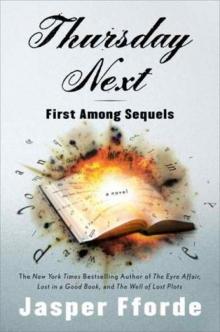 First Among Sequels
First Among Sequels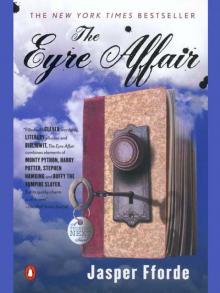 The Eyre Affair
The Eyre Affair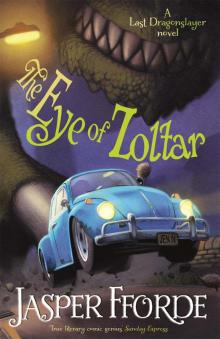 The Eye of Zoltar
The Eye of Zoltar The Woman Who Died a Lot
The Woman Who Died a Lot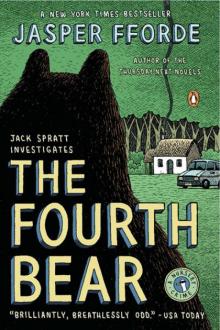 The Fourth Bear
The Fourth Bear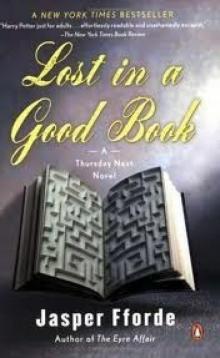 Lost in a Good Book
Lost in a Good Book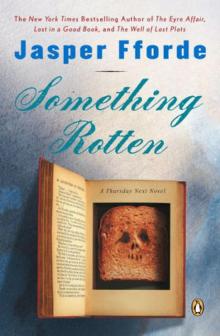 Something Rotten
Something Rotten The Well of Lost Plots
The Well of Lost Plots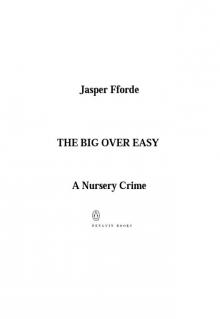 The Big Over Easy
The Big Over Easy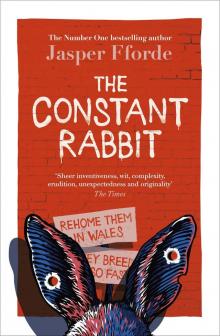 The Constant Rabbit
The Constant Rabbit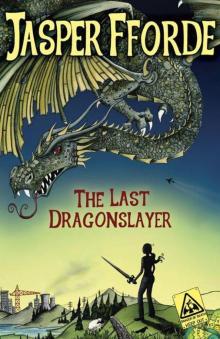 The Last Dragonslayer
The Last Dragonslayer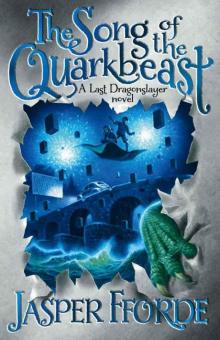 The Song of the Quarkbeast
The Song of the Quarkbeast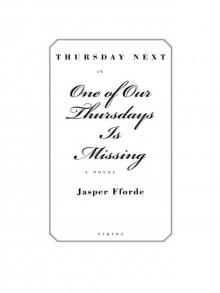 One of Our Thursdays Is Missing
One of Our Thursdays Is Missing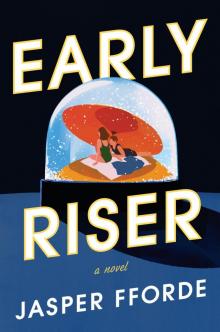 Early Riser
Early Riser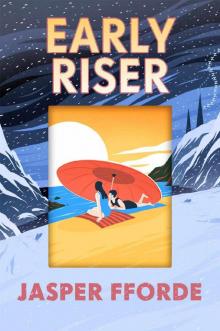 Early Riser_The new standalone novel from the Number One bestselling author
Early Riser_The new standalone novel from the Number One bestselling author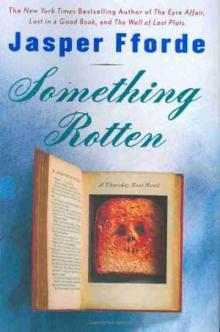 Something rotten n-4
Something rotten n-4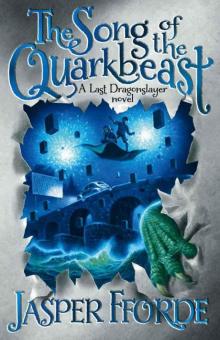 The Song of the Quarkbeast tld-2
The Song of the Quarkbeast tld-2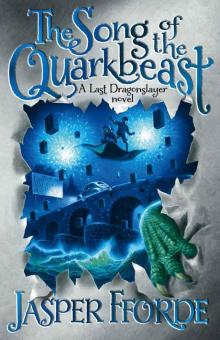 The Song of the Quarkbeast: Last Dragonslayer: Book Two
The Song of the Quarkbeast: Last Dragonslayer: Book Two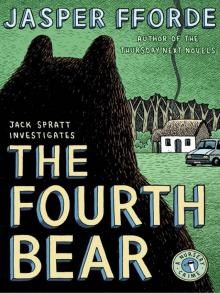 The Fourth Bear nc-2
The Fourth Bear nc-2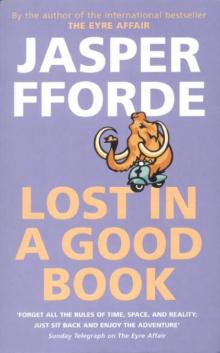 Lost in a Good Book tn-2
Lost in a Good Book tn-2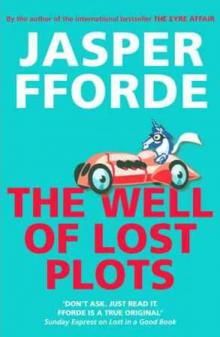 The Well of Lost Plots n-3
The Well of Lost Plots n-3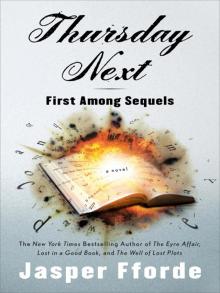 Thursday Next in First Among Sequels
Thursday Next in First Among Sequels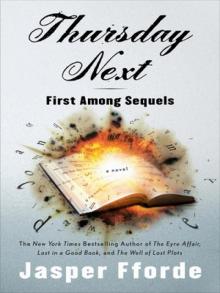 First Among Sequels tn-5
First Among Sequels tn-5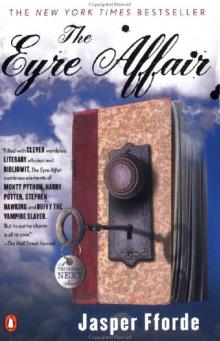 The Eyre Affair tn-1
The Eyre Affair tn-1